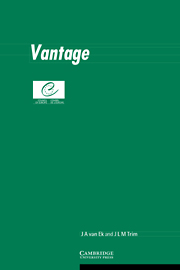Book contents
- Frontmatter
- Contents
- Introduction
- 1 The objective: levels of specificity
- 2 The objective: general characterisation
- 3 The objective: extended characterisation
- 4 The objective: components of the specification
- 5 Language functions
- 6 General notions
- 7 Topic-related tasks and lexicon
- 8 Discourse structure and verbal exchange
- 9 Dealing with texts: reading and listening
- 10 Writing
- 11 Sociocultural competence
- 12 Compensation strategies
- 13 Learning to learn
- 14 Degree of skill
- 15 By-products
- APPENDICES
5 - Language functions
Published online by Cambridge University Press: 28 January 2010
- Frontmatter
- Contents
- Introduction
- 1 The objective: levels of specificity
- 2 The objective: general characterisation
- 3 The objective: extended characterisation
- 4 The objective: components of the specification
- 5 Language functions
- 6 General notions
- 7 Topic-related tasks and lexicon
- 8 Discourse structure and verbal exchange
- 9 Dealing with texts: reading and listening
- 10 Writing
- 11 Sociocultural competence
- 12 Compensation strategies
- 13 Learning to learn
- 14 Degree of skill
- 15 By-products
- APPENDICES
Summary
Introduction
The Vantage learner, like the Threshold learner, is one who wishes to use a language (in our case English) to transact the business of daily living and enter into relations with the other speakers of that language in the situations which bring them together. For this reason there is no fundamental difference between language functions at the two levels. Threshold already covers a very wide range, though it does so with highly restricted means. To a large extent, the Vantage learner will cover the same broad range. Thus both Threshold and Vantage learners will need to assert facts, describe people and things and narrate events (cf. Section 1.2). However, the range of declarative sentences which a Vantage learner will be able to use will be much greater. That is, however, largely a matter of the means for expressing general and specific notions rather than of the function itself. (It should not be forgotten, of course, that the material for the exponence of functions is also available – often by no more than a change of person or tense – for referring to them in the course of a narrative or description. ‘I am in a bad mood’ expresses ill-humour. ‘I was in a bad mood’ or ‘he is in a bad mood’ reports rather than expresses that state of mind.)
Accordingly, we have seen no reason to change the broad categories in which language functions are classified.Beyond some minor reorganisation – seeking and granting permission have, for instance, been treated together with requests rather than under modality, while self-correction and hesitation fillers have been moved from Section 5 to 6 – the principal developments in a learner's expected ability to express functions are:
a more sensitive sub-categorisation of functions
[…]
- Type
- Chapter
- Information
- Vantage , pp. 27 - 59Publisher: Cambridge University PressPrint publication year: 2000



